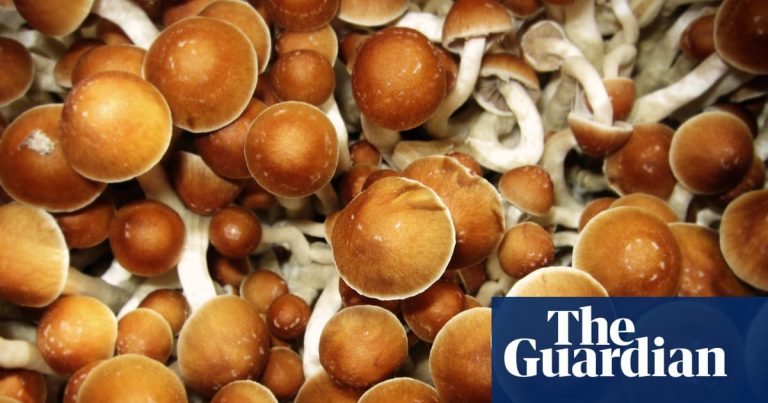MAgic mushrooms are rapidly growing in popularity, sparking a “psychedelic renaissance” as people become more interested in their mental health benefits. But experts have warned that using them recreationally risks doing more harm than good.
Trials exploring psilocybin as a revolutionary treatment for mental health problems have spawned a proliferation of psychedelic companies and retreats in countries where they are legal, while more people buy the drug, which is Class A in the UK, on the hidden market.
The latest Office for National Statistics data shows that psilocybin was the only illegal drug to increase in popularity in 2024, increasing 37.5% to 1.1% of 16-59 year olds, accounting for around 300,000 people and making the drug almost as popular as ‘ecstasy.
Experts said that while clinical trials showed promising results, new evidence suggests that people who take psilocybin outside of these environments may experience harm, including anxiety, trauma, insomnia , an ongoing visual distortion known as Hallucinogenic Persistent Perceptual Disorder (HPPD), and feelings of depersonalization.
General practitioners, psychiatrists and therapists lack the knowledge to treat the problem and sometimes misdiagnose patients with psychosis or mania, the experts added.
Jules Evans, director of the university research project Challenging Psychedelic Experience, which aims to improve tracking of adverse events, has interviewed people “in terrible crisis who say they were not aware that they might endure serious difficulties for days, weeks, months or years afterwards. », including some who were sectioned after discussing mythical experiences with a psychiatrist.
“There are people who are retraumatized by very difficult psychedelic experiences or who are retraumatized by very bad trips in suboptimal settings,” he said.
The distress may be compounded by the psychedelic integration coaches from whom people seek support, he said. “They have a certain dogmatic view of the world where psychedelics all know benevolent intelligences who always know what’s good for you – listen to the mushrooms, listen to mama ayahuasca.”
Although it is difficult to establish the prevalence of people who experience post-psychedelic harm, recent research found that 8.9% of respondents who had used psychedelics regularly over their lifetime reported impairments lasting more than one day.
Ed Prideaux, who studied adverse effects after undergoing HPPD, said years later that he still saw a “strange glow,” melting wallpaper and other optical illusions. He said “virtually everyone” in the psychedelic community has had at least one similar experience.
While myths circulated about psychedelics during their last popularity in the mid-20th century, Prideaux believes case As American pilot Joseph Everson, who crashed a plane two days after ingesting magic mushrooms, suggests, flashbacks require further research.
There are four clinics in Europe that offer specialist help. The most established is Ambulanz psychedelische Substanzen, a psychedelic outpatient clinic at Charité, a university hospital in Berlin, which offers online consultations for international clients.
Tomislav Majić, a psychiatrist, created the clinic in 2018 after finding that people were having bad experiences with clinicians who were unfamiliar with “the specific effects, risks and complications of psychedelics.” Most patients use them as “self-medication for mental health problems” and need psychological support, although some need psychiatric help, he said.
“There has been an increase in problems related to psilocybin and other classic psychedelics, likely due to the growing popularity and often overenthusiastic portrayal of these substances in the media and, in some cases, in discourse scientist. Statistically, there has been an increase in psychedelic-related presentations in emergency departments in some countries,” he said.
The Psychedelic Experience Clinic has recently become the UK’s leading specialist service. Its founder, Timmy Davis, director of psychedelic policy at the Center for Evidence Based Drug Policy, observed while working on clinical trials a lack of “post-trial support” and that recreational users were seeking a non-stigmatizing support.
“Some people see psychedelics as a way to treat mental health issues that they don’t really understand. They read books like The Body Keeps the Score, learn about trauma, and come to believe that the root of my suffering is a traumatic experience from my childhood. “It’s a pretty naive notion of mental health, and they look for retreats in Costa Rica or Jamaica, where they meet facilitators with the same naive notions,” he said.
David Erritzoe, associate professor of psychedelic research at Imperial College London, said the “Achilles heel” of psychedelics is that experiences can be dream-like and seem extremely real, in part because the drugs increase the suggestibility. People may believe they have resurfaced a “hidden memory” and wrongly conclude that they should use it to “understand myself, my relationships and my difficulties.”
“We need more strategies to educate people about these phenomena and provide support when it happens,” he said, adding that the fact that recreational use is now “extremely popular” suggests that health professionals should receive advice.
Psilocybin is relatively safe from a physical perspective, with headaches and nausea being the most common side effects, but he added: “There can be a lot of difficult psychological material, it can be relational, autobiographical , dreamlike in symbolic forms, deep elements of the psyche – this can be challenging, and sometimes even cause anxiety or fear.
The main risk factors are being young, having a high neuroticism score, being unprepared and being in a space that doesn’t feel safe, he said.
Erritzoe said there is “hype that is not helpful” around psilocybin, including microdosing, for which there is no solid evidence beyond a placebo effect. But he is “very optimistic” about its therapeutic potential, with a low risk of adverse effects in clinical trials because here they select participants and are very careful about setting and dosage, while researchers “continually try to ‘improve’ monitoring.
More data is needed before psilocybin can be authorized for medical use, but if regulators are satisfied with its safety and effectiveness, Erritzoe suggested it could join ketamine as a psychedelic treatment in the UK in three years.


